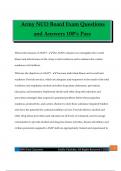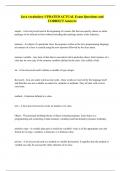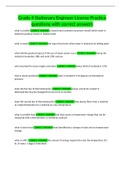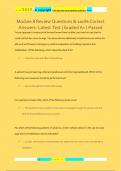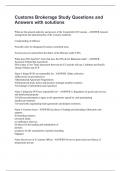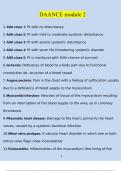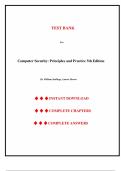Class notes & Case Summaries
Semester 2, Term 4
2020
This bundle has been compiled by JW Beukes. Copying any part of this bundle without
purchasing, or written permission from the author is a violation of copyright law and is
a punishable offence. Notes in this document have been compiled with reference to
the relevant textbooks, legislation and case law.
, Study Unit 6: Matrimonial Property – the
variable consequences of marriage
Barratt chapter 8 (pp 282-323)
Bopape and Another v Moloto 2000 (1) SA 383 (T)
General (p 282 – 283)
- Spouses have limited choice of matrimonial property systems
- Matrimonial property law:
o Set of legal rules which govern the patrimonial consequences of
marriage and divorce
o Regulate financial relationship between spouses during and after the
marriage.
o Regulates relationship between spouses
o and in relation to third parties
Types of matrimonial property systems (283 – 284)
Marriage in community of property
- Is the primary matrimonial system in South Africa (p284) Joint Estate
o For civil and customary marriages.
o Unless they have antenuptial contract stating Spouse Spouse
A B
otherwise
o Husband is domiciled in another country where
this property system is not default.
- Applicable to marriages concluded in terms of:
o Marriage Act
o Civil Union Act
, - Joint estate (284 – 287)
o A’s and B’s estates are merged at the conclusion of a marriage to form
a joint estate.
o All assets and liabilities are included, they are therefore co-owners of
everything.
o Undivided and indivisible shares
§ Not possible to own halve of something, they own everything
together in undivided shares.
- Separate Property (287 – 288)
o BUT: Although there exists a general rule that spouses become joint
owners of the estate, there are exceptions.
§ Assets excluded by an antenuptial contract
• This includes the money if the item were to be sold.
§ Assets excluded in a will or deed of donation:
§ Delictual damages from third parties for non-patrimonial losses
§ Delictual damages compensating for bodily injury inflicted by the
other spouse.
- S 14 of the Matrimonial Property Act:
o Spouses have equal powers to administer the joint estate, incur debts
that bind the joint estate
14 Equal powers of spouses married in community
Subject to the provisions of this Chapter, a wife in a marriage in community of property
has the same powers with regard to the disposal of the assets of the joint estate, the
contracting of debts which lie against the joint estate, and the management of the joint
estate as those which a husband in such a marriage had immediately before the
commencement of this Act.
,o Two Facets: (p 295)
§ Equal Management
• S 15(1)
• Except for the aspects listed in s 15(2) and s 15(3)
spouses may perform any juristic act with regard to the
estate without the consent of the other spouse.
§ Joint Management
• S 15(2); s 15(3) and s 17(1)
• Refer to “concurrent management of joint estate” also.
,15 Powers of spouses
(1) Subject to the provisions of subsections (2), (3) and (7), a spouse in a marriage in community
of property may perform any juristic act with regard to the joint estate without the consent of the
other spouse.
(2) Such a spouse shall not without the written consent of the other spouse -
a) alienate, mortgage, burden with a servitude or confer any other real right in any immovable
property forming part of the joint estate;
(b) enter into any contract for the alienation, mortgaging, burdening with a servitude or
conferring of any other real right in immovable property forming part of the joint estate;
(c) alienate, cede or pledge any shares, stock, debentures, debenture bonds, insurance
policies, mortgage bonds, fixed deposits or any similar assets, or any investment by or on
behalf of the other spouse in a financial institution, forming part of the joint estate;
(d) alienate or pledge any jewellery, coins, stamps, paintings or any other assets forming
part of the joint estate and held mainly as investments;
(e) withdraw money held in the name of the other spouse in any account in a banking
institution, a building society or the Post Office Savings Bank of the Republic of South Africa;
(f) enter, as a consumer, into a credit agreement to which the provisions of the National
Credit Act, 2005 (Act 34 of 2005) apply, as 'consumer' and 'credit agreement' are
respectively defined in that Act, but this paragraph does not require the written consent of a
spouse before incurring each successive charge under a credit facility, as defined in that
Act;
(g) as a purchaser enter into a contract as defined in the Alienation of Land Act, 1981 (Act
68 of 1981), and to which the provisions of that Act apply;
(h) bind himself as surety.
(3) A spouse shall not without the consent of the other spouse-
a) alienate, pledge or otherwise burden any furniture or other effects of the common
household forming part of the joint estate;
(b) receive any money due or accruing to that other spouse or the joint estate by way of:
[next page]
, i) remuneration, earnings, bonus, allowance, royalty, pension or gratuity, by virtue of
his profession, trade, business, or services rendered by him;
(ii) damages for loss of income contemplated in subparagraph (i);
(iii) inheritance, legacy, donation, bursary or prize left, bequeathed, made or awarded
to the other spouse;
(iv) income derived from the separate property of the other spouse;
(v) dividends or interest on or the proceeds of shares or investments in the name of
the other spouse;
(vi) the proceeds of any insurance policy or annuity in favour of the other spouse;
[*](c) donate to another person any asset of the joint estate or alienate such an asset without
value, excluding an asset of which the donation or alienation does not and probably will not
unreasonably prejudice the interest of the other spouse in the joint estate, and which is not
contrary to the provisions of subsection (2) or paragraph (a) of this subsection.
17 Litigation by or against spouses
(1) A spouse married in community of property shall not without the written consent of the other
spouse institute legal proceedings against another person or defend legal proceedings instituted
by another person, except legal proceedings-
(a) in respect of his separate property;
(b) for the recovery of damages, other than damages for patrimonial loss, by reason of the
commission of a delict against him;
(c) in respect of a matter relating to his profession, trade or business.
o Types of consent: (p 195 – 301)
§ Written, attested consent
§ Written consent
§ Oral (informal) / Tacit consent
§ No Consent (s 15(7))


